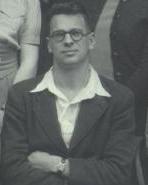Our website is made possible by displaying online advertisements to our visitors.
Please consider supporting us by disabling your ad blocker.
David Wheeler (computer scientist)
David Wheeler | |
|---|---|
 | |
| Born | David John Wheeler 9 February 1927[5] Birmingham, England |
| Died | 13 December 2004 (aged 77) Cambridge, England |
| Nationality | British |
| Education | University of Cambridge (MA, PhD) |
| Known for | inventing subroutines Burrows–Wheeler transform (BWT)[6] Tiny Encryption Algorithm (TEA)[7] Wheeler Jump[8] WAKE EDSAC[9] |
| Awards | Fellow of the Royal Society (1981) Computer Pioneer Award (1985) Fellow, Computer History Museum (2003)[1] |
| Scientific career | |
| Fields | Computer Science |
| Institutions | University of Cambridge Computer Lab, Cambridge Darwin College, Cambridge |
| Thesis | Automatic Computing With EDSAC (1951) |
| Doctoral advisor | Maurice Wilkes[2] |
| Doctoral students | |
David John Wheeler FRS (9 February 1927 – 13 December 2004)[10][11][12] was a computer scientist and professor of computer science at the University of Cambridge.[13][14][15][16]
- ^ "David John Wheeler: 2003 Fellow". Computer History Museum. Retrieved 15 May 2020.
- ^ a b c d e David Wheeler at the Mathematics Genealogy Project
- ^ Li, Gong; Wheeler, David J. (1990). "A matrix key-distribution scheme". Journal of Cryptology. 2 (1): 51–59. CiteSeerX 10.1.1.51.1279. doi:10.1007/bf02252869. S2CID 30468228.
- ^ Hopper, Andy (1978). Local Area Computer Communication Networks (PhD thesis). University of Cambridge.
- ^ Campbell-Kelly, Martin (2004). "Wheeler, David John (1927–2004)". Oxford Dictionary of National Biography. Vol. 1 (online ed.). Oxford University Press. doi:10.1093/ref:odnb/94633. (Subscription or UK public library membership required.)
- ^ Burrows, Michael; Wheeler, David J. (1994), A block sorting lossless data compression algorithm, Technical Report 124, Digital Equipment Corporation
- ^ Wheeler, D. J.; Needham, R. M. (1995). "TEA, a tiny encryption algorithm". Fast Software Encryption. Lecture Notes in Computer Science. Vol. 1008. p. 363. doi:10.1007/3-540-60590-8_29. ISBN 978-3-540-60590-4.
- ^ Wheeler, D. J. (1952). "The use of sub-routines in programmes". Proceedings of the 1952 ACM national meeting (Pittsburgh) on - ACM '52. p. 235. doi:10.1145/609784.609816. Archived from the original on 28 June 2015.
- ^ Wheeler, D. J. (1992). "The EDSAC programming systems". IEEE Annals of the History of Computing. 14 (4): 34–40. doi:10.1109/85.194053. S2CID 23064533.
- ^ Campbell-Kelly, M. (2006). "David John Wheeler. 9 February 1927 -- 13 December 2004: Elected FRS 1981". Biographical Memoirs of Fellows of the Royal Society. 52: 437–453. doi:10.1098/rsbm.2006.0030.
- ^ "David Wheeler, 1927–2004". Obituaries. Cambridge Computer Laboratory. Retrieved 21 July 2011.
- ^ "Professor David Wheeler". Obituaries. The Independent. London. 22 December 2004. Retrieved 21 July 2011.[dead link]
- ^ David Wheeler publications indexed by Microsoft Academic
- ^ Wheeler, D. J. (1994). "A bulk data encryption algorithm". Fast Software Encryption. Lecture Notes in Computer Science. Vol. 809. pp. 127–134. doi:10.1007/3-540-58108-1_16. ISBN 978-3-540-58108-6.
- ^ Hopper, A.; Wheeler, J. (October 1979). "Binary Routing Networks". IEEE Transactions on Computers. C-28 (10): 699–703. doi:10.1109/tc.1979.1675237. ISSN 0018-9340. S2CID 20076347.
- ^ Hopper, A.; Wheeler, D. (April 1979). "Maintenance of Ring Communication Systems". IEEE Transactions on Communications. 27 (4): 760–761. doi:10.1109/tcom.1979.1094451. ISSN 0090-6778.
Previous Page Next Page


